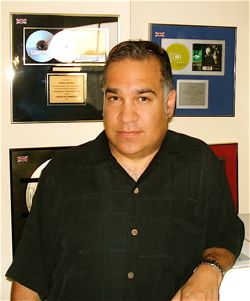Related Research Articles

A record producer or music producer is a music creating project's overall supervisor whose responsibilities can involve a range of creative and technical leadership roles. Typically the job involves hands-on oversight of recording sessions; ensuring artists deliver acceptable and quality performances, supervising the technical engineering of the recording, and coordinating the production team and process. The producer's involvement in a musical project can vary in depth and scope. Sometimes in popular genres the producer may create the recording's entire sound and structure. However, in classical music recording, for example, the producer serves as more of a liaison between the conductor and the engineering team. The role is often likened to that of a film director though there are important differences. It is distinct from the role of an executive producer, who is mostly involved in the recording project on an administrative level, and from the audio engineer who operates the recording technology.

In popular music, a cover version, cover song, remake, revival, or simply cover is a new performance or recording by a musician other than the original performer or composer of the song. Originally, it referred to a version of a song released around the same time as the original in order to compete with it. Now, it refers to any subsequent version performed after the original.

Columbia Records is an American record label owned by Sony Music Entertainment, a subsidiary of Sony Corporation of America, the American division of Japanese conglomerate Sony. It was founded on January 22, 1889, evolving from the American Graphophone Company, the successor to the Volta Graphophone Company. Columbia is the oldest surviving brand name in the recorded sound business, and the second major company to produce records. From 1961 to 1991, its recordings were released outside North America under the name CBS Records to avoid confusion with EMI's Columbia Graphophone Company. Columbia is one of Sony Music's four flagship record labels: Epic Records, and former longtime rivals, RCA Records and Arista Records as the latter two were originally owned by BMG before its 2008 relaunch after Sony's acquisition alongside other BMG labels.
A Taste of Honey is an American recording act, formed in Los Angeles, California in 1972 by associates Janice-Marie Johnson and Perry Kibble. In 1978, they had one of the best known chart-toppers of the disco era, "Boogie Oogie Oogie". After their popularity waned during the 1980s, Johnson went on to record as a solo artist and released the album One Taste of Honey. In 2004, Janice–Marie Johnson and Hazel Payne reunited to perform on the PBS specials Get Down Tonight: The Disco Explosion and My Music: Funky Soul Superstars. In 2022, A Taste of Honey featuring Janice-Marie kicked off the celebration of 50 years of impact in the music and entertainment industries. A Taste of Honey now consists of Janice-Marie Johnson and other accomplished musicians.
Warner Records Inc. is an American record label. A subsidiary of the Warner Music Group, it is headquartered in Los Angeles, California. It was founded on March 19, 1958, as the recorded music division of the American film studio Warner Bros.
Italo disco is a music genre which originated in Italy in the late 1970s and was mainly produced in the 1980s. Italo disco evolved from the then-current underground dance, pop, and electronic music, both domestic and foreign and developed into a diverse genre. The genre employs electronic drums, drum machines, synthesizers, and occasionally vocoders. It is usually sung in English, and to a lesser extent in Italian and Spanish.

The music industry refers to the individuals and organizations that earn money by writing songs and musical compositions, creating and selling recorded music and sheet music, presenting concerts, as well as the organizations that aid, train, represent and supply music creators. Among the many individuals and organizations that operate in the industry are: the songwriters and composers who write songs and musical compositions; the singers, musicians, conductors, and bandleaders who perform the music; the record labels, music publishers, recording studios, music producers, audio engineers, retail and digital music stores, and performance rights organizations who create and sell recorded music and sheet music; and the booking agents, promoters, music venues, road crew, and audio engineers who help organize and sell concerts.
Change is an Italian-American post-disco group formed in Bologna, Italy, in 1979 by businessman and executive producer Jacques Fred Petrus (1948–1987) and Mauro Malavasi. They were heavily influenced by the disco band Chic. The current incarnation of the group formed in 2018.

The Zomba Group of Companies was a music group and division owned by and operated under Sony Music Entertainment. The division was renamed to Jive Label Group in 2009 and was placed under the RCA/Jive Label Group umbrella. In 2011, the RCA/Jive Label Group was split in half. Multiple Jive Label Group artists were moved to Epic Records while others stayed with Jive as it moved under the RCA Music Group. In October 2011 Jive Records was shut down and their artists were moved to RCA Records.
Henry Stone, born Henry David Epstein, was an American record company executive and producer whose career spanned the era from R&B in the early 1950s through the disco boom of the 1970s to the 2010s. He was best known as co-owner and president of TK Records, but reportedly set up more than 100 record labels, and generated more than $100 million in record sales across the world. Stone was described as "an acute businessman who always made sure that contracts and publishing agreements were written in his favor."
Post-disco is a term to describe an aftermath in popular music history circa 1979–1986, imprecisely beginning with the backlash against disco music in the United States, leading to civil unrest and a riot in Chicago known as the Disco Demolition Night on July 12, 1979, and indistinctly ending with the mainstream appearance of new wave in 1980. During its dying stage, disco displayed an increasingly electronic character that soon served as a stepping stone to new wave, old-school hip hop, Euro disco, and was succeeded by an underground club music called hi-NRG, which was its direct continuation.

Nadir Khayat, also known as RedOne, is a Moroccan/Swedish record producer, record executive, singer and songwriter. Currently, he holds the FIFA's Creative Entertainment Executive position. RedOne is considered one of the most influential record producer artists in contemporary music. As a record producer and songwriter, he has worked with many worldwide high-profile recording artists, most notably Lady Gaga, Nicki Minaj, Jennifer Lopez, Enrique Iglesias, Shakira, Mariah Carey, One Direction, and Usher, among many others. His production discography boasts many Billboard and international hits. RedOne has established his own record label named RedOne Records.

Safta Jaffery was the British founder and owner of one of the first producer management companies in the United Kingdom called SJP/Dodgy Productions. The company's producers produced albums for artists such as Radiohead, The Stone Roses, Roger Waters, Rolling Stones, Razorlight, Supergrass, Coldplay and The Cure, among others. They amassed over 150 certified platinum, gold and silver sales awards all across the globe. Jaffery was also the co-owner and managing director of the music publishing company Taste Music, Ltd. and the artist management company Taste Media, Ltd. Taste Media managed and produced a number of high-profile artists, most notably discovering, and representing the rock band Muse.

Michael Caren is an American record executive. He founded Artist Publishing Company in 2007, as well as its subsidiary Artist Partner Group in 2013. He has served as the President of Worldwide A&R at Warner Music Group from 2012 to 2015, as well as the company's Creative Officer until 2020, Executive Vice President of A&R at Atlantic Records from 2007 to 2012, and Co-president of Elektra Entertainment from 2008 to 2012.
Nick Raphael is a music industry executive and entrepreneur born in London, England. He is a former President of Capitol Records in the UK.
Peter Edge is an English-American record executive. He is the chairman and CEO of RCA Records.

"Te Quiero" is a Latin pop song by Guatemalan recording artist Ricardo Arjona, released on 5 July 2012 as the third single from his 13th studio album, Independiente (2011). The song was written by Arjona, who produced it with longtime collaborators Dan Warner and Lee Levin under their stage name Los Gringos. Additional recording work was handled by Peter Wallace, Matt Rollings, Carlos "Cabral" Junior and Isaías García.
Dave Kusek is an American business executive, music educator, author, and software developer known for his work in the music industry. After working as chief engineer at Star Instruments in the 1970s, in 1980 he became the founding CEO of the music software company Passport Designs. With Passport he helped develop Master Tracks and Encore, and also co-developed software and hardware that utilized the then newly introduced MIDI interface.
Oscar Joseph Llord is a Latin music entertainment executive, producer and businessman. He is the owner of We R 1 Music Group. Llord headed Sony Music Entertainment's Latin division from 1996 through 2003.
Gary Gersh is an American music industry executive who previously managed musical artists including Nirvana, Soundgarden and the Foo Fighters. As president of AEG's touring division he has worked with bands and musicians such as Luke Combs, Tyler, the Creator and Panic! at the Disco to develop international arena tours. Gersh has described the division as "a central, internal operation that would sign and execute tours globally". He describes AEG as "just one more place people can move up".
References
- Albini, Steve (1993), "The Problem with Music", The Baffler , no. 5, Chicago: Thomas Frank, archived from the original on 28 September 2007, retrieved 20 June 2009 (Reprinted in Maximum Rocknroll no. 133 (June 1994) and later various websites.)
- Goldberg, Danny (2009), Bumping into Geniuses, Penguin Publishing, ISBN 978-1-59240-483-4
- Knopper, Steve (2009), Appetite for self-destruction : the spectacular crash of the record industry in the digital age, New York: Free Press, ISBN 978-1-4165-5215-4
- Kusek, David; Leonhard, Gerd (2005), The future of music : manifesto for the digital music revolution, Boston: Berklee Press, ISBN 0-87639-059-9
- Prial, Dunstan (2006), The producer : John Hammond and the soul of American music, New York: Farrar, Straus and Giroux, ISBN 0-374-11304-1
- Shoemer, Karen (30 October 1992), "Some Alternative Boundaries Fall", The New York Times
- Weissman, Dick (2003), The music business : career opportunities and self-defense, New York: Three Rivers Press, ISBN 0-609-81013-8